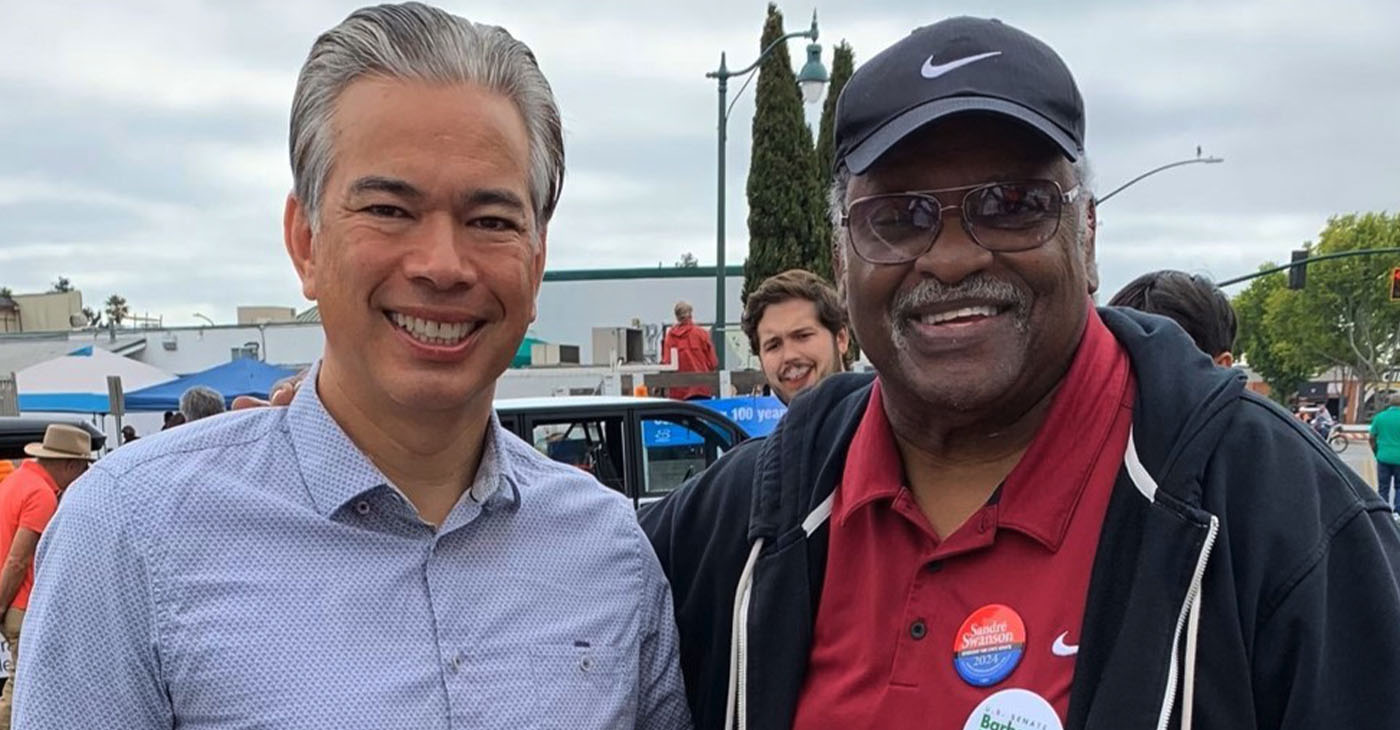California Black Media
California Black Media Political Round-Up
The California Black Women’s Collective Empowerment Institute (CABWCEI) is launching a statewide effort called “Conversations for Black Women — Building an Economic Action Plan Tour” in collaboration with the Bank of Montreal (BMO) lasting from the end of July until mid-November.

By Joe W. Bowers Jr.,
Edward Henderson
California Black Media
Black Women’s Group Tour on Economic Empowerment to Make Stop in Oakland
The California Black Women’s Collective Empowerment Institute (CABWCEI) is launching a statewide effort called “Conversations for Black Women — Building an Economic Action Plan Tour” in collaboration with the Bank of Montreal (BMO) lasting from the end of July until mid-November.
CABWCEI is a coalition of Black women whose goal is to amplify the voices of Black women everywhere and leverage their political power and in turn alleviate the political, economic, and safety challenges that they face.
The objective of the tour, organizers say, is to develop an economic action plan that helps Black women build wealth and overcome barriers through transformative policies and practices.
CABWCEI does this by ensuring that Black women are represented at every level of leadership particularly in the public sector, and by identifying, recruiting, and creating accessible resources.
This year’s tour will stop in six parts of the state, San Diego (July 29), Solano (Aug. 26), Sacramento (Sept. 23), Oakland (Oct. 14), Fresno (Oct.21), and the Inland Empire (Nov. 18) and offer a variety of opportunities, including mentorship programs, homeownership counseling, apprenticeships, job coaching, financial planning, and entrepreneurship support.
Tour partners include California Black Media and Black Women Organized for Political Action (BWOPA).
“BWOPA is delighted to partner in this much-needed enterprise,” said founding member Gay Plair Cobb. “Wealth building through entrepreneurship and related activities is essential to the economic advancement of Black women and to overcoming historic disadvantages we’ve faced as a result of systemic racism. We look forward to a much brighter economic future thanks to events such as these.”
Brenda Hudson, finance manager at the Oakland Post, thinks that tour will help Black women in Oakland.
“We have to develop a support system and have less competitiveness, so that we can build up generational wealth.” She also spoke about her own personal experience, explaining that her daughter lived with her for years, saving money, and now owns a four-bedroom house.
“That kind of community support is what is needed in order to rise up together. CABWCEI is trying to do that and more with their upcoming tour,” Hudson said.
Cathy Adams, president of the Oakland African American Chamber of Commerce, said that this tour and its objectives are much needed in the Black community and especially for Black women.
Investors and finance managers reach out to her frequently to talk about trust issues Black people have in seeking or receiving advice about money.
“This is a great opportunity for our women to learn how to maximum our return on our investment,” she said, especially as so many people are dealing with financial fallout from the pandemic.
The strategies that could be learned on the tour “can change the narrative … change the landscape on how we deal with money as a rule … so that all of us can be on top of the money train,” Adams said.
It’s a great time to get support without being what she termed “money-shamed” for not adequately investing or preparing for retirement or failing to read fine print.
“You can show up and invest — in yourself or with each other,” she said, “working with people you trust.”
— Post Staffer Daisha Williams contributed to this story.
Gov. Newsom Updates State’s Opioid Plan to Include New Deadly Drug “Tranq”
Gov. Gavin Newsom has updated his strategy to combat opioid abuse in California by introducing measures to address a new deadly drug xylazine, also known as ‘tranq’ on the streets.
This animal sedative is increasingly being mixed with fentanyl, making it even more deadly. According to data from the Centers for Disease Control and Prevention (CDC), the percentage of fatal opioid overdoses involving ‘tranq’ increased by 276%, from 2.9% to 10.9% between January 2019 through June 2022.
Newsom’s ‘Master Plan for Tackling the Fentanyl and Opioid Crisis’ focuses on holding the opioid pharmaceutical industry accountable, cracking down on drug trafficking and raising awareness about the dangers of opioids. The plan includes addressing emerging threats like ‘tranq.’
“California has an all-hands-on-deck strategy for tackling the fentanyl and opioid crisis impacting every community across our state,” said Newsom in a statement. “Education and outreach are critical tools in our arsenal to prevent tragedy, to connect people with treatment, and to fight the life-threatening stigma that stops too many people from getting help.”
California has allocated $30 million to fund the production of naloxone, the anti-overdose drug. Newsom has also increased anti-drug-trafficking operations, especially at the San Ysidro border crossing in San Diego, where a significant amount of fentanyl enters into the state.
AG Bonta Releases Reports on Crime, Juvenile Justice, Guns, Homicides and Use of Force
California Attorney General Rob Bonta announced the release of the annual Homicide in California, Crime in California, Use of Force Incident Reporting, Juvenile Justice in California, and Crime Guns in California statistical reports.
The reports contain statistics for 2022 as submitted by California law enforcement agencies and other criminal justice organizations.
Findings indicated 612 civilians were involved in incidents that involved the discharge of a firearm or use of force resulting in serious bodily injury or death.
Of those civilians: 48.4% were Hispanic. 25.3% were White, and a disproportionate 19.3% were Black. Black Californians account for about 5.72% of the state’s population.
In 2022, there were 2,206 homicides reported in the state, a decrease of 6.6% from 2361 reported in 2021. The rate of violent crime per 100,000 people increased by 6.1% from 466.2 in 2021 to 494.6 in 2022. The homicide arrest rate decreased by 5.9% in 2022 compared to 2021 and the violent offense arrest rate increased by 3.4% compared to 2021.
“Having access to good data is a cornerstone of responsible public policy. The data released today is essential for understanding, preventing, and combating crime,” said Bonta. “In 2022, California made significant progress toward reducing its homicide rates, but more remains to be done.
“While crime rates remain significantly below their historical highs, property and violent crimes continue to have devastating consequences for communities across the state.”
Activism
Racially Motivated Violence Against Black Teen Prompts $10 Million Claim Against LAUSD
In December, a second altercation, on a video shared with news media, showed 4 to 6 boys attacking a Black student and using racial slurs. The video also shows a person in a safety vest trying to stop the fight and telling them to “handle it after school.” Then, the video ends.

By Solomon O. Smith, California Black Media
A distraught mother and her legal team announced a $10 million lawsuit against the Los Angeles Unified School District (LAUSD) on Dec. 16, alleging that her son was the target of bullying because of his race.
“CS DOE is a 14-year-old African American student at Verdugo High School. He is a Ninth Grader,” reads a statement the plaintiff’s attorneys shared with California Black Media (CBM).
“Almost from the first day of class (in August 2024), CS DOE was targeted by Latino students who called him racial slurs, physically attacked him and threatened to stab him.”
The family’s identity has not yet been released to the public due to safety concerns, according to their attorneys Bradley C. Gage and Caree Harper. The student’s mother is identified only as A.O. in the complaint.
The first video, filmed in August, showed several non-Black students punching and kicking a Black student in a bathroom on campus while yelling racial slurs. The mother claims that the students who attacked her son were not punished, and the administration asked her to move her son to another school for his safety.
“They wanted him to leave the school without giving any disciplinary action towards those students,” said the student’s mother. “He’s not going anywhere. He’s going to finish. I wanted him to at least stay until the December winter break, and then I was going to transfer schools for him.”
Before she could enroll her son in a different school the attacks escalated.
In December, a second altercation, on a video shared with news media, showed 4 to 6 boys attacking a Black student and using racial slurs. The video also shows a person in a safety vest trying to stop the fight and telling them to “handle it after school.” Then, the video ends.
CS DOE, a 14-year-old freshman, left the school but was followed by a car, according to Gage. Several individuals exited the vehicle, one with a “large butcher knife.” A fight ensued and two people were stabbed. The Black student was arrested for assault with a deadly weapon but was later released into his mother’s custody.
The high school freshmen is scheduled to appear in juvenile court on Feb. 1, but Harper says she will reach out to the District Attorney and make the case against charging the young man.
“His mama had to go find him because he was hiding and fleeing for his very life,” said Harper.
According to the boy’s mother, the young student is still traumatized and has not been able to return to the area because it remains unsafe. Racial slurs have also been spray painted on their home.
“I’m sad. I’m devastated, you know,” said the mother. “I still feel like they’re after him. I still feel like they can kill him, possibly.”
The LAUSD and principal of Verdugo High School did not respond to CBM’s requests for comment.
If you are – or someone you know is – has experienced a hate crime or hate incident, please visit CAvsHate.org for more information and to find out what you can do about it.
Activism
2024 In Review: 7 Questions for the California Association of Black School Educators
CABSE members represent governmental agencies, charter schools and charter school organizations, public school districts, traditional public schools, and community colleges. The organization’s primary goal is to expand PK-14 educational opportunities for all students in California, with an emphasis on under-represented and under-served Black students.

By Edward Henderson, California Black Media
The California Association of Black School Educators (CABSE) is an organization consisting of elected and appointed school officials, administrators and instructors from across California who are committed to advancing equity for Black students.
CABSE members represent governmental agencies, charter schools and charter school organizations, public school districts, traditional public schools, and community colleges.
The organization’s primary goal is to expand PK-14 educational opportunities for all students in California, with an emphasis on under-represented and under-served Black students.
California Black Media (CBM) spoke with CABSE President Satra Zurita and Conference Chair Micah Ali about this year’s successes, disappointments, and plans for the organization coming into the new year.
Looking back at 2024, what stands out to you as your most important achievement and why?
Ali: I would have to say that two highlights have been the ongoing support of the Bill and Melinda Gates Foundation, Engie, and other sponsors that have enabled us to bring together like-minded education leaders twice a year to collectively advance innovative and meaningful strategies to achieve change on behalf of Black students across our state.
How did your leadership and investments contribute to improving the lives of Black Californians?
Zurita: CABSE’s leadership and investment in improving the education system for Black students in our great state has resulted in a long-standing focus on transforming public education and its response to Black students. By pulling from the very wisdom of those educators and leaders who care deeply about Black students and who are showing great promise through their efforts.
What frustrated you the most over the last year?
Zurita: Continuing to see the deep impact of COVID-19 Pandemic school site closures on students academically and emotionally — especially Black students. This makes our work and our advocacy more vital than ever.
CBM: What inspired you the most over the last year?
Zurita: Seeing our CABSE convenings grow in depth and breadth — our strategies, powerful content and reach.
What is one lesson you learned in 2024 that will inform your decision-making next year?
Ali: Our Blueprint for Education Equity is a crowd-sourced framework of strategies that have shown great promise for improving the education experiences and opportunities for Black students. In 2024, we developed an equity self-assessment tool for districts to use in evaluating their own efforts on behalf of Black students. Strategies are helping Black students.
In one word, what is the biggest challenge Black Californians face?
Zurita: Many Black students across our state are dealing with a host of challenges: homelessness, food insecurity, exposure to violence, not to mention bias remains a pervasive problem. To add to the challenge, educators are worn out, tired, and frustrated. We now need to think about how we can simultaneously inspire and empower students and educators alike. The system needs an overhaul.
What is the goal you want to achieve most in 2025?
Zurita: In 2025, we hope to stand CABSE up as a fully functioning non-profit organization engaged in research and policy design.
Ali: We also aim to deepen the content of our convenings, including adding a Math Track and what we are calling Social Determinants of Education Track to our annual conference and institute, which will address those social contexts that prevent Black students from realizing their potential as students.
Activism
2024 in Review: 7 Questions for Social Justice Executive Kaci Patterson
Kaci Peterson, the founder and Chief Architect of Social Good Solutions and the Black Equity Collective, has over 18 years of experience in the non-profit and philanthropy sectors. California Black Media (CBM) spoke with Peterson recently. She discussed the organization’s successes, disappointments, and lessons from 2024 as they continue their initiatives into the new year.

By Edward Henderson, California Black Media
The Black Equity Collective (BEC) is a community-focused, public-private partnership with Black equity as its central, driving force.
Born out of two organizations – the Social Good Solutions Firm and the Black Equity Initiative — BEC’s mission is centered on the belief that progress on Black equity and racial justice must be part of any credible social justice movement in the United States. Additionally, the collective believes equity is only achieved when philanthropic investments, public policies, and institutional practices converge to boldly confront racial injustice.
Kaci Peterson, the founder and Chief Architect of Social Good Solutions and the Black Equity Collective, has over 18 years of experience in the non-profit and philanthropy sectors.
California Black Media (CBM) spoke with Peterson recently. She discussed the organization’s successes, disappointments, and lessons from 2024 as they continue their initiatives into the new year.
Looking back at 2024, what stands out to you as your most important achievement and why?
This year, we celebrated our 10-year anniversary as a firm. Since the firm’ s inception we are proud to announce that cumulatively we’ve been able to raise and leverage over $55.5 million for Black-led organizations in California.
One of the things that we have accomplished is our expanded membership. We had an initial goal of 30 to 40 organizations. We have a current membership of 54 organizations and a waiting list of over 120.
How did your leadership and investments contribute to improving the lives of Black Californians?
We launched a survey involving 200 Black-led organizations to study the economic impact of Black-led organizations on California’ s GDP. The results of that survey will be released in early 2025.
What frustrated you the most over the last year?
The decline in philanthropic investment after the height of commitments following the murder of George Floyd, following COVID.
What inspired you the most over the last year?
I am always inspired by the leaders on the ground who just continue to do monumental work. The fact that here in Los Angeles, we’ve been able to stand up a doula hub in response to the policy advocacy work that so many of our leaders, our Black women in particular, really pushed and got state legislation passed a couple of years ago so that doulas can be an approved and reimbursable expense through Medi-Cal.
What is one lesson you learned in 2024 that will inform your decision-making next year?
I started an 11-week sabbatical on Nov. 1. I think oftentimes as Black leaders, we are burning the candle at both ends. And I don’ t think Black people are even aware of the social, emotional, and physical toll that taken on us/ We must rest, retreat and take respite as part of our journey to justice.
In one word, what is the biggest challenge Black Californians face?
Erasure.
We’ve really leaned into a narrative of Black permanence and what it means to preserve our community, our culture, our contributions, our language, our history, our leaders, our institutions.
What is the goal you want to achieve most in 2025?
I really want to start up an endowment for the collective. I think it’s really important to be able to preserve all of the things that the collective has contributed the philanthropic ecosystem so far.
-

 Activism4 weeks ago
Activism4 weeks agoOakland Post: Week of November 27 – December 3, 2024
-

 Activism3 weeks ago
Activism3 weeks agoPost News Group to Host Second Town Hall on Racism, Hate Crimes
-

 Activism3 weeks ago
Activism3 weeks agoButler, Lee Celebrate Passage of Bill to Honor Congresswoman Shirley Chisholm with Congressional Gold Medal
-

 Activism1 week ago
Activism1 week agoBooks for Ghana
-

 Activism3 weeks ago
Activism3 weeks agoDelta Sigma Theta Alumnae Chapters Host World AIDS Day Event
-

 Arts and Culture2 weeks ago
Arts and Culture2 weeks agoPromise Marks Performs Songs of Etta James in One-Woman Show, “A Sunday Kind of Love” at the Black Repertory Theater in Berkeley
-

 Business3 weeks ago
Business3 weeks agoLandlords Are Using AI to Raise Rents — And California Cities Are Leading the Pushback
-

 Activism2 weeks ago
Activism2 weeks agoOakland Post: Week of December 11 – 17, 2024

























































